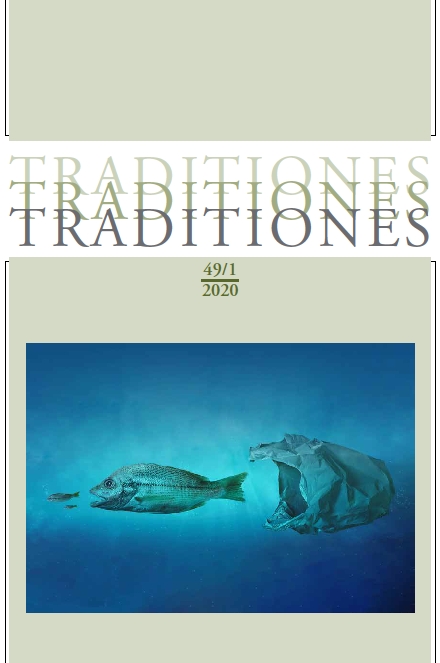Values Underpinning a Degrowth Transformation of the Socio-Political System
DOI:
https://doi.org/10.3986/Traditio2020490108Keywords:
degrowth paradigm, cultural change, sustainable socio-political system, value systems, ideology, ISSPAbstract
This paper deals with attitudes, values and ideologies as potentials in influencing cultural change toward more environmentally and socially sustainable socio-political system. The main framework of the discussion is the degrowth paradigm and the results of analyses are based on the two modules of the International Social Survey Program (2017). The main indicator of the (social) degrowth potentiality is the ‘degrowth scale’, consisting of dimensions related the end of economic growth and the need for social change. Those dimensions are (statistically) contextualised within respondents’ socio-demographic characteristics, and their other values and attitudes, and discussed within the degrowth paradigm.
Downloads
References
Anderson, Kevin, and Peter Hudis. 2004. The Rosa Luxemburg Reader. New York: Monthly Review Press.
Campbell, James. 1986. Essays in Anglo-Saxon History. London, UK: The Hambledon Press.
Chase-Dunn, Christopher, and Thomas D. Hall. 1997. Rise and Demise: Comparing World Systems. Abingdon: Routledge.
Črpić, Gordan, and Siniša Zrinščak. 2010. Dinamičnost u stabilnosti: religioznost u Hrvatskoj 1999. i 2008. godine. Društvena istraživanja 19 (1–2): 3–27.
Dale, Gareth. 2012. The Growth Paradigm: A Critique. International socialism 134: 55–88.
D’Alisa, Giacomo, and Claudio Cattaneo. 2013. Household Work and Energy Consumption: A Degrowth Perspective. Catalonia’s Case Study. Journal of Cleaner Production 38: 71–79.
D’Alisa, Giacomo, Federico Demaria, and Giorgos Kallis (eds.). 2014. Degrowth: A Vocabulary for a New Era. Abingdon: Routledge.
Domazet, Mladen. 2019. Degrowth-Compatible Common Senses in Croatia. Südosteuropa Mitteilungen 05–06: 158–168.
Domazet, Mladen, and Dinka Marinović Jerolimov (eds.). 2014. Sustainability Perspectives from the European Semi-Periphery. Zagreb: Institute for Social Research.
Drews, Stefan, and Jeroen CJM van den Bergh. 2016. Public Views on Economic Growth, the Environment and Prosperity: Results of a Questionnaire Survey. Global Environmental Change 39: 1–14.
EVS. 2015. European Values Study Longitudinal Data File 1981-2008 (EVS 1981-2008). GESIS Data Archive, Cologne. ZA4804 Data file Version 3.0.0. DOI: https//doi.org/10.4232/1.12253.
Eysenck, Hans Jurgen. 1954. The Psychology of Politics. NJ: Transaction Publishers.
Gramsci, Antonio. 2007. Prison Notebooks: Selections. London, UK: Lawrence & Wishart Limited.
Jasanoff, Sheila. 2015. Science and Technology Studies. In: Karen Backstrand and Eva Lovbrand (eds.), Research Handbook on Climate Governance. Cheltenham, UK: Edward Elgar Publishing, 36–48.
Kallis, Giorgos. 2018. Degrowth. Newcastle upon Tyne: Agenda Publishing.
Latour, Bruno. 1993. We Have Never Been Modern. Cambridge, MA: Harvard University Press.
Malm, Andreas. 2016. Fossil Capital: The Rise of Steam Power and the Roots of Global Warming. London, UK: Verso Books.
Mannheim, Karl. 1949. Ideology and Utopia. London: Routledge and Kegan Paul.
Moore, Jason W. 2015. Capitalism in the Web of Life. London, UK: Verso Books.
Purdey, Stephen J. 2010. Economic Growth, the Environment and International Relations: The Growth Paradigm. Abingdon: Routledge.
Simkus, Albert, and Kristen Ringdal. 2016. The Aftermath of War: Experiences and Social Attitudes in the Western Balkans. Abingdon: Routledge.
Steffen, Will, Paul J. Crutzen, and John R. McNeill. 2007. The Anthropocene: Are Humans Now Overwhelming the Great Forces of Nature? AMBIO: A Journal of the Human Environment 36 (8): 614–621. DOI: https://doi.org/10.1579/0044-7447(2007)36[614:TAAHNO]2.0.CO;2.
Tsing, Anne L. 2005. Friction. An Ethnography of Global Connection. Princeton: Princeton University Press.
Wallerstein, Immanuel. 1998. The Rise and Future Demise of World-Systems Analysis. Review (Fernand Braudel Center) 21 (1): 103–112.
Waring, Marilyn. 1999. Counting for Nothing: What Men Value and What Women are Worth. University of Toronto Press.
Wark, McKenzie. 2015. Molecular Red: Theory for the Anthropocene. London, UK: Verso Books.
Downloads
Published
How to Cite
Issue
Section
License

This work is licensed under a Creative Commons Attribution-NonCommercial-NoDerivatives 4.0 International License.
Authors guarantee that the work is their own original creation and does not infringe any statutory or common-law copyright or any proprietary right of any third party. In case of claims by third parties, authors commit their self to defend the interests of the publisher, and shall cover any potential costs.
More in: Submission chapter






